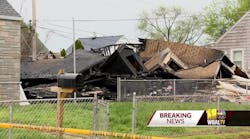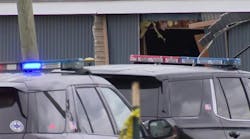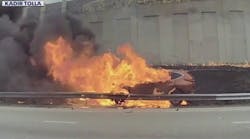Odds are that right now, you are thinking about how wonderful your Thanksgiving (food) was and how great the upcoming Christmas, Hanukkah, Kwanzaa and New Year's holiday season (food) is going to be. Typically, when we give thanks and celebrate, food is involved. Amen.
Love being a firefighter? After we get filled up with spirit, celebration, food and family, we often sit back and start thinking about stuff, and about being firefighters. This time of year, we especially think about next year. What are we going to do? What will the economy do? What about all the firefighters who have lost their jobs? What about the cities that now, with horrendous cuts, continue to fool themselves and their citizens into thinking that even with the cuts we'll all be just fine. That is, until "that" fire comes in. Sometimes we can make a difference and sometimes we simply can't. That doesn't at all mean that we give up when there is hope of any kind. It's just that sometimes it's time to take on other issues and battles.
I was just with a good friend who also writes a monthly column. John Salka and I were talking about how much time anyone should spend trying to change something that simply will not change. We agreed that each of us has only so much energy and time, and that it should be put to the best use possible, to good use to make a real difference. Now, to be clear, neither he nor I (or most of our friends, and probably you) gives up very easily, absolutely not, and we will often push hard. And, like most of you, we absolutely love being firefighters. But sometimes, we all must "size-up" and determine the best "tactics" when it comes to changing things — even possibly "writing off" the unchangeable and just try to save the block, so to speak. But more often than not, we keep pushing.
Because it is the Christmas season, I am going to take some liberty and share a story with you about a firefighter who was not one to give up. He kept pushing.
A few weeks ago, the fire service lost a fire chief named Pete Brown to cancer. Chief Brown was the fire chief for the Aniak Volunteer Fire Department, a small, rural community on the Kuskokwim River in western Alaska. (Chief Brown also served in the U.S. military during Vietnam.) The entire fire department: about a half-dozen adults, including a schoolteacher and bush pilot, and about a dozen high school students. Girl students, to be specific. Their equipment: one ambulance and an aging 1976 pumper truck in need of repair. This year, the Aniak firefighters will handle at least 300 emergency calls.
Aniak is isolated. There are no roads to any other village in Alaska, and Anchorage is 350 miles away. The only way to access Aniak is via aircraft; it's about a 1½-hour flight from Anchorage. Aniak, population 572, doesn't offer many of the things young people growing up seem to want — no multiplex, no music scene, few jobs. The firefighters' closest mutual aid is the Bethel Fire Department, which is about a half-hour away by plane and several hours by boat.
It takes someone special to be a "great" fire chief and, according to friends in Alaska, Chief Pete Brown was one of the greatest. As the volunteer fire chief for Aniak, Pete launched an ambulance service with borrowed pickups and snow machines. He saved lives up and down the Kuskokwim River and trained more than two decades of village teenagers to do the same.
Teenagers? The facts are that back in the late 1990s, Chief Pete was presented with a common problem for fire chiefs: too few responders and a very small pool of potential members. Not one to give in to challenges, the chief tapped into a terrific resource. He went to the high school and spoke with the kids about getting involved in the fire department.
Many fire departments have cadet or Explorer programs, but Aniak needed fully trained firefighters and first responders as quickly as possible, so Chief Pete immediately began training the kids to be Emergency Trauma Technicians (Alaska's first responders) and having them run on calls. He also started their firefighter training, including survival and safety. He was advised against this by "officials" worried about liability and funding. Chief Pete, however, told them to "go scratch." He was the chief, he needed responders, and the adults in town were not available or were not willing. Period. He kept pushing.
Initially, only boys joined the department; however, the boys soon turned to hunting, fishing and sports and no longer had time for the department. That's when the girls in the community stepped up and became the core of the department. The girls. The younger members of the department named themselves the Dragon Slayers and they have gained national notice for the great things they have accomplished. Some of you may remember the great Reader's Digest article about them. Here is the link: http://www.rd.com/all-girl-rescue-squad/article33273.html.
I probably would not be writing about Aniak in this month's column if that was the end of the story — but it's not. Pete found that many of the kids who joined the Dragon Slayers did not have solid homes, so not only did he become their fire chief, he became their surrogate Dad. Many of the kids stayed at his house when they did not have a safe home to go to.
To stay on the department, they had to get good grades, couldn't drink or party, had to attend all of the required training — and had to turn out when the runs came in. He taught them to set small, easily accomplished goals. If they messed up, they had to face the consequences, but if they were willing, they could come back to the department and try again.
As more and more people heard about what was happening in Aniak, requests for similar training started coming in from other communities in Alaska. Chief Brown and the kids started visiting schools to talk about the program, the fire and rescue services, and establishing goals.
They then started Camp Kick Ash, a four- to six-week program that teaches kids 14 to 18 about EMS, fire and rescue. The course also prepares them for careers in firefighting, health care or emergency response. Quite often, the instructors for Camp Kick Ash are kids and young adults who started their fire and emergency service careers with the Dragon Slayers in Aniak. Camp Kick Ash has happened in many communities around Alaska. For example, 130 kids attended the Galena Camp Kick Ash this summer.
As should be in any "great" chief's job description, Chief Pete Brown recognized that everyone has potential and he made the effort to bring that potential out in kids who would not have been given that opportunity otherwise. One of the last things that Pete told everyone was, "The kids can do this. They just needed someone to tell them that and show them how." Chief Pete Brown loved being a firefighter — and he proved it.
Sadly, like well over 1,000 other active firefighters each year, Pete died of cancer several weeks ago. When Pete learned that his cancer was terminal, he asked to have his Celebration of Life take place before he died so that he could say goodbye to everyone. Hundreds of people attended to thank him for his many years of service to Alaska and the nation. Sounds like a great fire chief to us. (Our sincere thanks to Jodie Hettrick, fire training administrator for the Alaska Division of Fire and Life Safety, for her assistance.)
Rest in peace, Chief Pete Brown.
Why write about this tough, but great chief in the Close Calls column? Being the holiday season, I wanted to do something different — but something that would matter to you. And as sad as Chief Pete's passing is, the story of how he made a positive difference is worthy of note.
How can you, as a firefighter relate? My primary purpose is, again, to beg you to get a regular physical and to be screened for cancer. For many of you, that is by getting your colonoscopy. Yeah, it's a pain in rear (actually, not really), but it will help you continue doing what you love. After all, if you have ever said or thought that you love being a firefighter, then getting screened is one way to extend your time as a firefighter as long as possible. Cancer is nasty and can impact everyone in your life — including your life. But until you get screened, you simply do not know.
While digesting your holiday meal, think about the Chief Petes and how many firefighters, EMTs, officers and chiefs have made a major positive difference. Hopefully, you have worked with good folks like that. And as you think about your "resolutions" for 2010, consider your colonoscopy and other cancer screenings (make sure you doctor is aware that you are a firefighter) in addition to a physical, driving to arrive when responding, belting in, stopping before going through intersections, sizing-up, getting water on the fire as a top priority and risking what's worth risking during 2010. And don't forget training. Make every day a training day. Hands on. Classroom. Reading. Online. Seminars. All of it. Train. Make 2010 the year you and your members train more than ever before.
We are in a dangerous and risky business and sometimes the worst may have to happen to some of us in the performance of the job. Be it rare, the fact is that when people need to be rescued (note: plan your search training), we are the ones who must do it. We aren't talking about the risks that must be taken. We are talking about the risks that can be avoided while still being highly affective firefighters.
Close calls? Be it getting health screenings or operating smarter (by training and without reducing effectiveness), we can minimize the unnecessary close calls and line-of-duty deaths. If you love being a firefighter, then why wouldn't you take a few self-motivated steps to keep doing it as long as possible? Keep pushing. Push hard.
Some of you or members of your fire department or family may be dealing with cancer. Please reach out to the Firefighter Cancer Support Network, as its members have many ways to support you, including firefighter-to-firefighter (and family-to-family) connections. Career, part time, volunteer — whatever; if you are a firefighter dealing with cancer in any aspect of your life, see www.firefightercancersupport.org.
From my family and our department to yours, we wish you the absolute best for a happy, healthy and peaceful 2010. Please keep our soldiers who are serving our country in your thoughts and prayers for a safe return home.
WILLIAM GOLDFEDER, EFO, a Firehouse® contributing editor, is a 33-year veteran of the fire service. He is a deputy chief with the Loveland-Symmes Fire Department in Ohio, an ISO Class 2 and CAAS-accredited department. Goldfeder has been a chief officer since 1982, has served on numerous IAFC and NFPA committees, and is a past commissioner with the Commission on Fire Accreditation International. He is a graduate of the Executive Fire Officer Program at the National Fire Academy and is an active writer, speaker and instructor on fire service operational issues. Goldfeder and Gordon Graham host the free and noncommercial firefighter safety and survival website www.FirefighterCloseCalls.com. Goldfeder may be contacted at [email protected].





